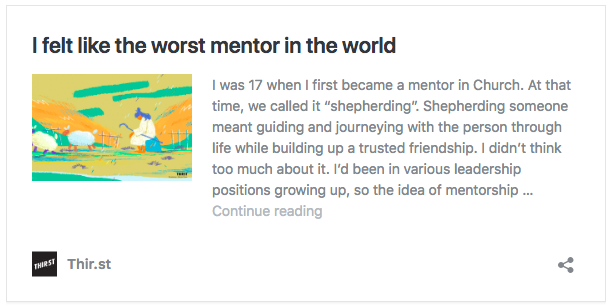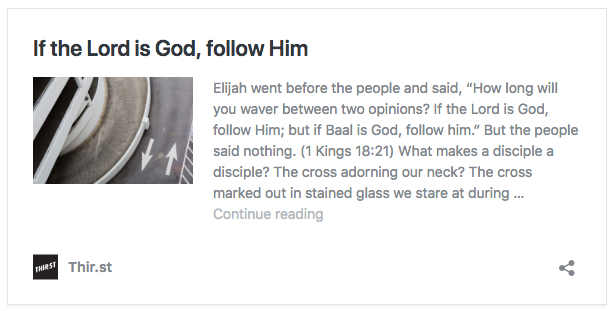Many of us have the privilege of being both mentors and mentees.
Being in a mentoring relationship is important because we are living out the call of Hebrews 10:24–25 to persevere in faith: “And let us consider how we may spur one another on toward love and good deeds, not giving up meeting together, as some are in the habit of doing, but encouraging one another.”
I enjoy being a mentee immensely. My mentors, all godly women, are always patient and generous in all aspects with me. Most of them mentored me for a specific reason or season like difficult circumstances or ministry. And even when our mentoring relationship officially ended, they remained trustworthy confidantes.
There still remains a small handful of individuals who are mentoring me in life. They will always be very dear to me. That is simply because through their actions for me, I experienced the Father’s love – even when I could not yet recognise Him in my life.

Despite my initial wariness and reluctance to open up to them, not once did they shy away from this rebellious spitfire who was always wearing a mask of nonchalance.
They never said no to me when I cried out to them for help and they were always ready to share their wisdom with me. They never hesitated to correct, rebuke or challenge me with the truth that is God’s Word. They also never hesitated to edify and encourage me as well.
And so they helped me grow into a woman who submitted to the Lord’s hand over my life.
“The point of being a mentor is not having your mentee become like you, it’s for her to become more like Christ”
It thus seemed natural for me to want to mentor as well when the time came. In fact, I couldn’t wait to be involved in a younger person’s life.
I even wanted a “bad” mentee so that I could be challenged and be able to see the immense growth that individual would have.
I’m cringing even as I write out what my original intentions for being a mentor were. What I actually wanted was to appear important and better than whoever I was going to mentor. My saviour-mentality only reflected the ungodly pride in my heart.
“In his pride the wicked man does not seek him; in all his thoughts there is no room for God.” (Psalm 10:4)
I had missed the point of mentoring entirely – to journey with and not to dominate someone else. And as much as it crushed my pride, I am thankful that no one asked me to mentor them in my season of arrogance.
In fact, it was one of my own mentors who alerted me to my saviour-mentality when I complained to her about my mentee-less situation over a meal. “The point of being a mentor is not having your mentee become like you, it’s for her to become more like Christ”, she said.
After all, although Paul wrote in 1 Corinthians 11:1 to the church in Corinth, “Follow my example,” he also emphasised that he was following “the example of Christ.”
My mentors did not attempt to make me a replica of them. Instead, by any possible means, they were always leading me to Christ.

The Bible is filled with people who were involved in mentoring relationships – formal and informal. Some of them ended well, like Elijah and Elisha, but there are pairs like Saul and David, whose relationship deteriorated into enmity.
Tauren Wells, a Christian singer-songwriter, shares that these 2 pairings had different endings because of the different legacies each mentor passed down.
Saul let David borrow his personal armour when the boy was going up against Goliath, the giant Philistine (1 Samuel 17). But David took Saul’s armour off because he wasn’t used to it (1 Samuel 17: 39). He instead went with his own sling and stones and eventually defeated the enemy.
Saul’s armour could not fit David simply because it was not made for him. David was “little more than a boy, glowing with health and handsome,” (1 Samuel 17: 42) while Saul was king and a head taller than anyone in Israel (1 Samuel 9: 2).
On the other hand, when the prophet Elijah was swept up to Heaven in 2 Kings 2, he left his cloak behind for Elisha to pick up. This was the cloak which Elijah had just used to separate the waters of Jordan and represented the authority he had as a prophet of God.
Elisha had to make the conscious decision to pick that cloak up, it reflected his decision to pursue his calling as a prophet. And Wells says the cloak was an extension of authority and covering for Elisha from both God and Elijah.
Elisha immediately used it to separate the same waters of Jordan when he returned, and all the other prophets gathered recognised that the spirit of Elijah was upon him (2 Kings 2:15).

With these 2 stories in mind, what are we looking to pass on to our mentees in our journey with them? Words I borrowed from writers and individuals I admired? Or my mantle of faith from my own walk with God?
Passing the mantle is just the cherry on the cake. How can we empower our mentees to pursue God and make their walk their own?











